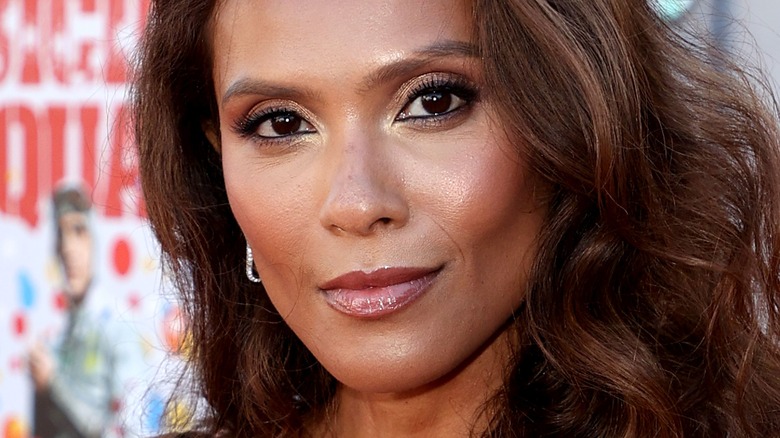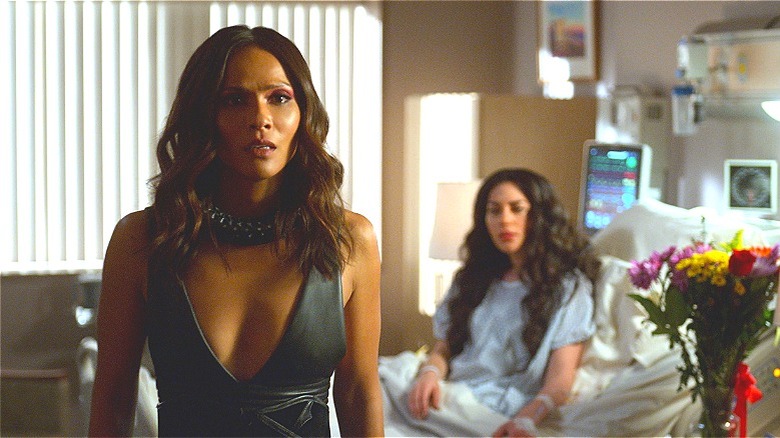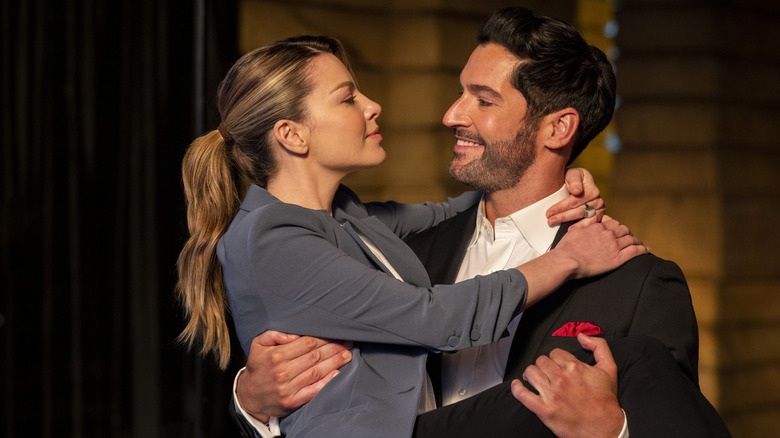Lesley-Ann Brandt's Surprising Real-Life Connection To Her Lucifer Character
The character of Lucifer's left-hand woman, Mazikeen, is territory that has seen a lot of action. Jewish mythology refers to entities called mazzikim, but the woman behind the demon is most recognizable in recent pop culture (per Jewish Virtual Library). The character first gained success from the pages of Neil Gaiman's comic "The Sandman," recently adapted with a few key differences for Netflix. In the show and the comic, the demon with half a mutilated face is entirely devoted to Lucifer (Gwendoline Christie).
Netflix's "Lucifer" is technically adapted from the same source material, though it takes an entirely different tactic (per Polygon). Taking place in a world where Lucifer (Tom Ellis) takes a vacation from Hell for sunny Los Angeles, the series resembles little of the source material. But what it lacks in faithfulness to the comic, it more than makes up for in spirit. "Lucifer" uses ridiculous fun to its benefit as the fallen angel utilizes his devilish powers to solve crimes with the help of Detective Chloe Decker (Lauren German). Maze (Lesley-Ann Brandt) rounds out Lucifer's team and occasionally helps him with bounty hunting. And while this may seem out of the realm of possibility, Brandt has an interesting connection to the character she plays.
Feeling out of place is a human experience
A demon may not be the easiest person to sympathize with, but actor Lesley-Ann Brandt certainly found a way. Uncompromising and loyal only to Lucifer (at first), Maze follows him from Hell when he decides to vacation from his duties. Maze's discomfort at leaving her home of Hell for Los Angeles is something that Brandt identified with when portraying the character.
"I sorta look at her journey similar honestly to when I immigrated from South Africa to New Zealand and, as an immigrant from Hell, trying to fit in those first few seasons and figuring out how to deal with humans and relationships and all these new feelings," Brandt told L'Officiel. Though Maze follows Lucifer implicitly, it isn't exactly unquestioningly. She doesn't understand his motivations and misses the comforts of evil deeds from home.
But what starts as a story of Maze's demonic nature ultimately turns into a beautiful story of character development. Maze finds fulfillment in not just her bond with Lucifer but the relationships she cultivates. She finds a loving partner in Eve (Inbar Lavi), and the two eventually get married. After however many millennia of relishing in torturing souls, Maze becomes someone worthy of love.
"I think going through those feelings with her; I certainly learned a lot from her just in the act of playing her. But I really am proud of who she ends up being at the end of our show," Brandt concluded.
The finale brings the human experience full circle
Maze's character progression is just one satisfying way "Lucifer" rounded out its final season. Season 6 marked the official end of the series after Netflix extended the series not once but twice (via The Wrap). This way, writers Ildy Modrovich and Joe Henderson could end the show exactly the way they wanted to. What was most important to the showrunners was that "Lucifer" finished out in a way that was faithful to the message they had been trying to tell all these years: Though the world is full of demons, angels, and nephilim, "Lucifer" tells human stories.
"I think our show has really zinged over the years, and again, credit to Joe and Ildy for this for really tapping into the family side of things because that is so relatable to people," Tom Ellis told Entertainment Weekly after the finale. After Lucifer makes the ultimate sacrifice to leave his life with Chloe and help the damned souls in need, fans were given the ending they always deserved. Though some "Lucifer" fans were upset with the ending, it does reunite Chloe and Lucifer, the best couple in the series. After Chloe eventually dies, she chooses to join Lucifer in Hell and help him shepherd lost souls. Lauren German in particular, was in favor of the show's final message: "I like that there's this idea that we can all do better, we can all change, there's a chance for us."


